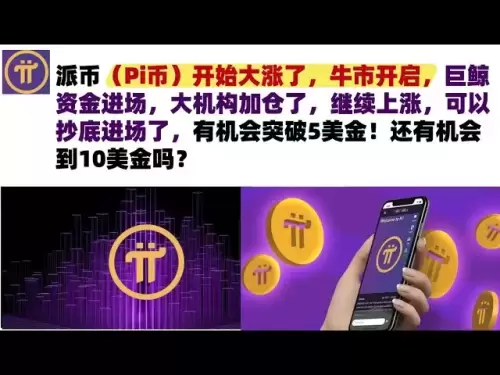-
 Bitcoin
Bitcoin $116700
0.48% -
 Ethereum
Ethereum $4213
6.27% -
 XRP
XRP $3.280
1.22% -
 Tether USDt
Tether USDt $1.000
0.02% -
 BNB
BNB $805.1
2.46% -
 Solana
Solana $180.2
2.65% -
 USDC
USDC $0.0000
0.02% -
 Dogecoin
Dogecoin $0.2412
8.50% -
 TRON
TRON $0.3356
-1.11% -
 Cardano
Cardano $0.8108
3.59% -
 Hyperliquid
Hyperliquid $43.89
8.53% -
 Chainlink
Chainlink $21.15
10.75% -
 Stellar
Stellar $0.4502
1.41% -
 Sui
Sui $3.935
4.69% -
 Bitcoin Cash
Bitcoin Cash $570.7
-1.75% -
 Hedera
Hedera $0.2636
3.28% -
 Avalanche
Avalanche $24.25
4.48% -
 Ethena USDe
Ethena USDe $1.001
0.03% -
 Litecoin
Litecoin $122.0
-0.08% -
 Toncoin
Toncoin $3.445
2.68% -
 UNUS SED LEO
UNUS SED LEO $8.979
-0.08% -
 Shiba Inu
Shiba Inu $0.00001379
6.73% -
 Uniswap
Uniswap $10.91
2.00% -
 Polkadot
Polkadot $4.106
5.39% -
 Dai
Dai $1.000
0.02% -
 Pepe
Pepe $0.00001227
9.07% -
 Bitget Token
Bitget Token $4.507
0.72% -
 Cronos
Cronos $0.1576
3.40% -
 Monero
Monero $272.0
-1.68% -
 Ethena
Ethena $0.7502
21.27%
What is the Bitcoin contract transaction fee?
Bitcoin transaction fees are dynamic, varying based on network congestion, transaction size, and user-selected priority; miners prioritize higher fees, and tools help estimate costs for timely confirmation.
Mar 02, 2025 at 03:58 am
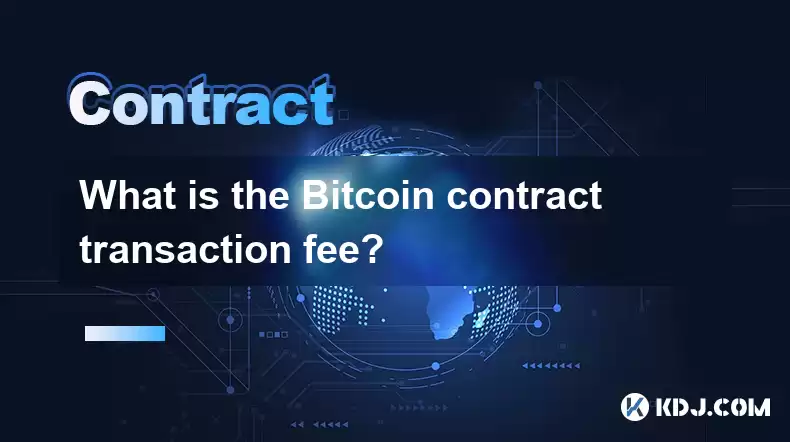
What is the Bitcoin Contract Transaction Fee? A Deep Dive into Bitcoin Transaction Costs
Key Points:
- Bitcoin Transaction Fees are not fixed: Unlike many centralized payment systems, Bitcoin transaction fees are dynamic and depend on several factors, including network congestion, transaction size, and the priority assigned by the sender. There's no single "Bitcoin contract transaction fee."
- Fees are paid to miners: Miners, who verify and add transactions to the blockchain, receive these fees as compensation for their computational work. Higher fees incentivize miners to prioritize your transaction.
- Transaction size matters: Larger transactions (e.g., those involving many inputs or outputs) generally incur higher fees. Smart contracts, while not directly part of the Bitcoin base protocol, can indirectly influence transaction size and therefore fees if they trigger numerous on-chain actions.
- SegWit and other upgrades: Network upgrades like SegWit have aimed to reduce transaction fees by making transactions more efficient. Understanding these upgrades is crucial for optimizing fee payments.
- Fee estimation tools are essential: Various online tools and wallets provide fee estimations based on current network conditions. Using these tools is critical to ensure timely transaction confirmation.
Understanding Bitcoin Transaction Fees in Detail
- The Role of Miners and Block Rewards: Bitcoin miners are individuals or entities that use powerful computers to solve complex mathematical problems. The first miner to solve the problem gets to add the next block of transactions to the blockchain. They receive two types of rewards for this: a block reward (currently 6.25 BTC per block) and transaction fees. The block reward is a pre-programmed, fixed amount, whereas the transaction fee is variable and directly impacts the miner's profitability. The higher the transaction fees attached to a transaction, the more likely it is that a miner will include it in the next block they mine, as it increases their overall reward. This competition amongst miners for transactions with high fees ensures that transactions are processed relatively quickly, despite the decentralized and permissionless nature of the network. The dynamics of block rewards and transaction fees are intrinsically linked, as miners always prioritize transactions with higher fees to maximize their earnings, thus indirectly creating a competitive market for transaction inclusion.
- Factors Influencing Bitcoin Transaction Fees: The cost of sending a Bitcoin transaction isn't a static figure; it fluctuates depending on various factors. Network congestion is a significant contributor. When the network is busy (many transactions pending), miners are inundated with requests. Consequently, they can afford to be selective, prioritizing transactions with higher fees. This results in higher transaction fees for users. Conversely, during periods of low network activity, fees tend to be lower because miners are less competitive. Transaction size also plays a role. Transactions that involve many inputs or outputs (e.g., consolidating many smaller UTXOs) are larger and require more processing power, hence attracting higher fees. The complexity of the transaction script also factors in. More complex scripts require more computation from miners and thus lead to higher fees. Finally, the user's chosen fee rate directly influences the transaction speed. Setting a higher fee increases the likelihood of faster confirmation. A lower fee means your transaction might wait longer in the mempool (the pool of unconfirmed transactions). This is particularly relevant for time-sensitive transactions.
- SegWit and its Impact on Transaction Fees: Segregated Witness (SegWit) is a significant upgrade to the Bitcoin protocol implemented in 2017. It aimed to address scalability issues and reduce transaction fees. SegWit achieves this by separating the transaction signature data from the main transaction data, making transactions smaller and more efficient. This reduction in size directly translates to lower transaction fees. SegWit also enhances the block capacity, allowing more transactions to be processed per block, reducing congestion and subsequently lowering fees. The impact of SegWit on transaction fees is substantial, although its effectiveness depends on widespread adoption by users and wallets. While SegWit has undoubtedly improved the efficiency of the Bitcoin network, it's not a panacea. Network congestion during periods of high activity can still lead to increased transaction fees, even with SegWit in place. Understanding SegWit's role is crucial for appreciating the mechanisms behind Bitcoin transaction fee fluctuations.
- Estimating and Paying Bitcoin Transaction Fees: Accurately estimating Bitcoin transaction fees is crucial to ensure timely transaction processing. Many wallets and online tools provide real-time fee estimations based on current network conditions. These tools typically offer different fee levels (e.g., low, medium, high), each corresponding to a different transaction confirmation time. Choosing a higher fee level guarantees faster confirmation but results in a higher cost. Conversely, opting for a lower fee level might save money but could lead to significantly longer confirmation times, sometimes even days. It's important to use reputable fee estimation tools and understand the trade-off between speed and cost. Improper fee estimation can result in transactions being stuck in the mempool indefinitely, potentially leading to financial losses. Understanding the current network congestion and choosing an appropriate fee level based on your transaction's urgency is vital for a smooth and efficient transaction experience. Furthermore, understanding the fee structure of your chosen wallet or exchange is also important, as they may add their own fees on top of the network fees.
- The Role of Smart Contracts (Indirect Influence): Bitcoin itself does not have built-in smart contract functionality like Ethereum. However, the concept of smart contracts can indirectly influence Bitcoin transaction fees. If a system or application built on top of Bitcoin (like the Lightning Network) uses smart contract-like logic, it might trigger multiple on-chain transactions. Each of these transactions incurs a fee. Therefore, the overall cost of interacting with such a system can be significant, even if the underlying smart contract logic is relatively simple. This indirect influence highlights the importance of understanding the implications of any system or application that uses the Bitcoin blockchain for complex operations, as the seemingly simple action could result in numerous transactions and consequently higher fees. The potential for increased fees due to indirect smart contract usage necessitates careful consideration when interacting with such systems.
FAQs:
Q: What is the average Bitcoin transaction fee?
A: There's no fixed average. It fluctuates greatly depending on network congestion, transaction size, and the fee you choose to pay. Use fee estimation tools for current estimates.
Q: How can I reduce my Bitcoin transaction fees?
A: You can reduce fees by:
* Sending transactions during periods of low network activity.
* Consolidating your UTXOs (Unspent Transaction Outputs) to reduce transaction size.
* Using a wallet that offers efficient fee estimation and management.
* Choosing a lower fee level (but accepting a longer confirmation time).
Q: What happens if I pay too low of a transaction fee?
A: Your transaction might remain unconfirmed for an extended period, or even indefinitely. The miners will prioritize transactions with higher fees.
Q: Are there any alternative ways to reduce Bitcoin transaction costs?
A: Yes, layer-2 solutions like the Lightning Network offer significantly lower transaction fees and faster confirmation times compared to the main Bitcoin blockchain. However, they require setting up a Lightning node or using a Lightning-enabled wallet.
Q: Are there any hidden fees associated with Bitcoin transactions?
A: The primary fee is the miner's fee for including your transaction in a block. Some exchanges or wallets might add their own fees on top of this, so it's important to check their fee schedules.
Q: How are Bitcoin transaction fees calculated?
A: The calculation is complex, involving factors like transaction size (in bytes), the current network congestion (measured by the mempool size and the block propagation speed), and the fee rate (satoshis per byte) you choose. Miners essentially compete for transactions with the highest fee rate per byte.
Q: What is the difference between a Bitcoin transaction and a Bitcoin contract transaction?
A: Bitcoin doesn't natively support contracts in the same way as Ethereum. Any reference to a "Bitcoin contract transaction" would imply a transaction related to a system or application built on top of Bitcoin that utilizes smart contract-like functionality, possibly triggering multiple underlying Bitcoin transactions, each with its own fee. There is no specific "contract transaction" type within the Bitcoin protocol itself.
Q: Can I predict Bitcoin transaction fees?
A: You can't accurately predict them, but you can estimate them using various online tools and wallets that provide real-time fee estimations based on current network conditions. These estimations are helpful but not foolproof, as network conditions can change rapidly.
Disclaimer:info@kdj.com
The information provided is not trading advice. kdj.com does not assume any responsibility for any investments made based on the information provided in this article. Cryptocurrencies are highly volatile and it is highly recommended that you invest with caution after thorough research!
If you believe that the content used on this website infringes your copyright, please contact us immediately (info@kdj.com) and we will delete it promptly.
- Trump, Crypto Vehicle, and WLFI Tokens: A New York Minute on the Latest Buzz
- 2025-08-10 00:30:12
- Wheat Penny Fortune: Unearthing Valuable Coins in Your Pocket Change
- 2025-08-10 00:35:19
- AI Coin Mania: Dubai Millionaires Eye 20x Gains!
- 2025-08-09 23:10:12
- ChatGPT's Hot Takes: Meme Coins to Buy Now for a Wild 2025!
- 2025-08-09 23:10:12
- Jurassic Park Vibes in Your Pocket: The Colourful Canadian Coin Featuring a Dinosaur Eye
- 2025-08-09 23:50:12
- Altcoins on the Radar: VeChain, Ethereum, and the Shifting Crypto Landscape
- 2025-08-09 23:50:12
Related knowledge
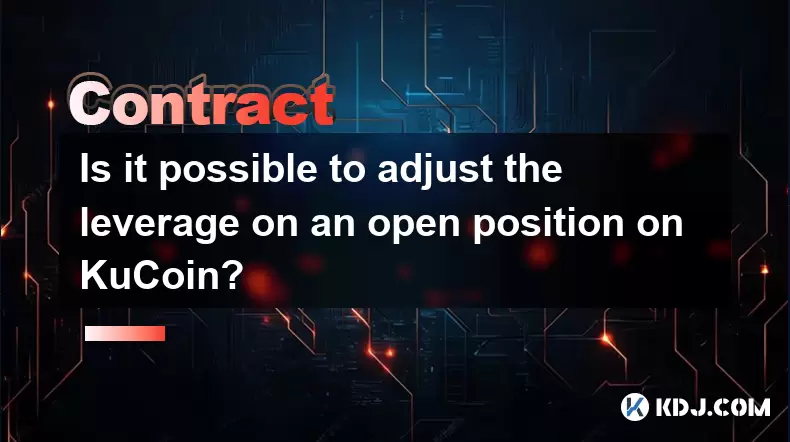
Is it possible to adjust the leverage on an open position on KuCoin?
Aug 09,2025 at 08:21pm
Understanding Leverage in KuCoin Futures TradingLeverage in KuCoin Futures allows traders to amplify their exposure to price movements by borrowing fu...
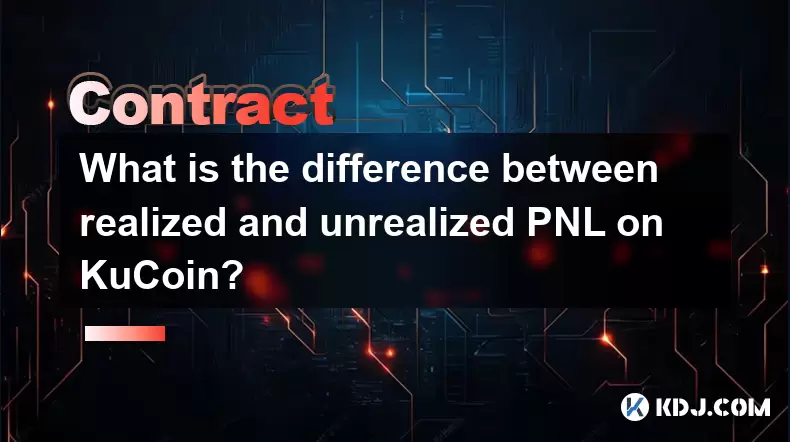
What is the difference between realized and unrealized PNL on KuCoin?
Aug 09,2025 at 01:49am
Understanding Realized and Unrealized PNL on KuCoinWhen trading on KuCoin, especially in futures and perpetual contracts, understanding the distinctio...
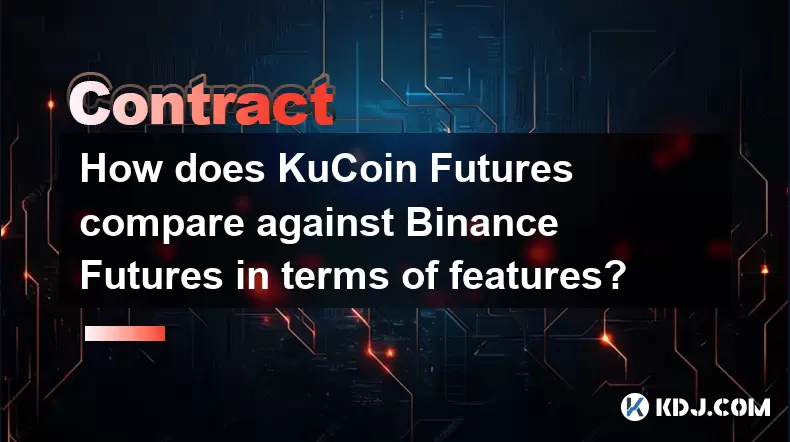
How does KuCoin Futures compare against Binance Futures in terms of features?
Aug 09,2025 at 03:22am
Trading Interface and User ExperienceThe trading interface is a critical component when comparing KuCoin Futures and Binance Futures, as it directly i...
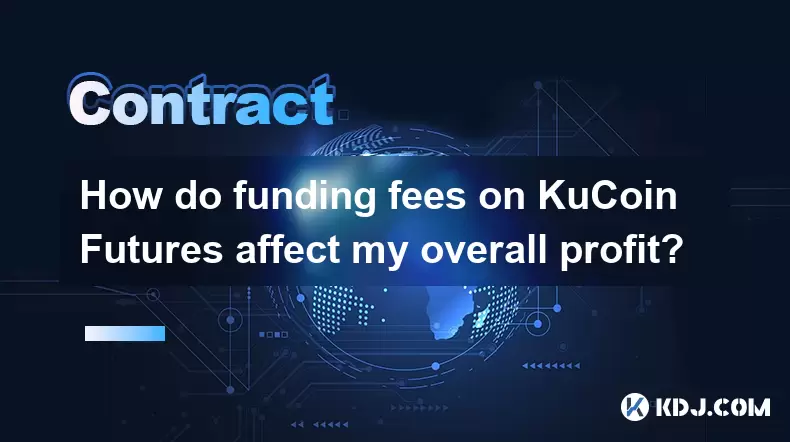
How do funding fees on KuCoin Futures affect my overall profit?
Aug 09,2025 at 08:22am
Understanding Funding Fees on KuCoin FuturesFunding fees on KuCoin Futures are periodic payments exchanged between long and short position holders to ...
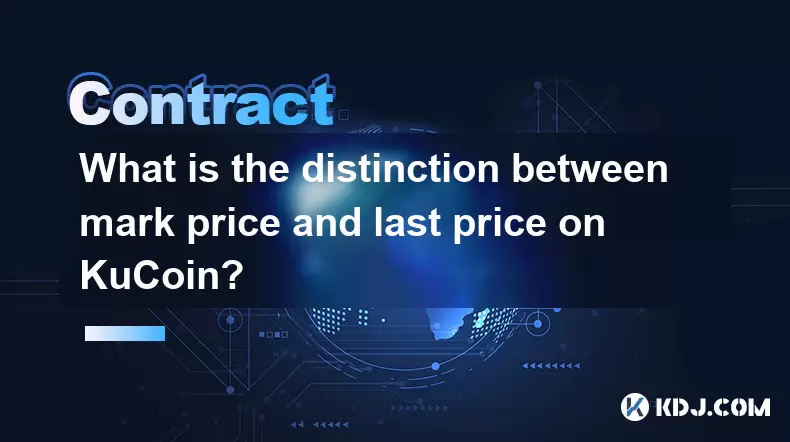
What is the distinction between mark price and last price on KuCoin?
Aug 08,2025 at 01:58pm
Understanding the Basics of Price in Cryptocurrency TradingIn cryptocurrency exchanges like KuCoin, two key price indicators frequently appear on trad...
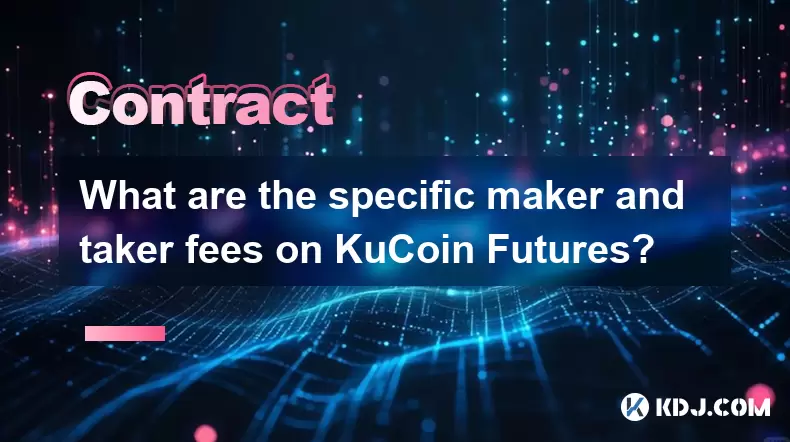
What are the specific maker and taker fees on KuCoin Futures?
Aug 08,2025 at 08:28am
Understanding Maker and Taker Fees on KuCoin FuturesWhen trading on KuCoin Futures, users encounter two primary types of fees: maker fees and taker fe...

Is it possible to adjust the leverage on an open position on KuCoin?
Aug 09,2025 at 08:21pm
Understanding Leverage in KuCoin Futures TradingLeverage in KuCoin Futures allows traders to amplify their exposure to price movements by borrowing fu...

What is the difference between realized and unrealized PNL on KuCoin?
Aug 09,2025 at 01:49am
Understanding Realized and Unrealized PNL on KuCoinWhen trading on KuCoin, especially in futures and perpetual contracts, understanding the distinctio...

How does KuCoin Futures compare against Binance Futures in terms of features?
Aug 09,2025 at 03:22am
Trading Interface and User ExperienceThe trading interface is a critical component when comparing KuCoin Futures and Binance Futures, as it directly i...

How do funding fees on KuCoin Futures affect my overall profit?
Aug 09,2025 at 08:22am
Understanding Funding Fees on KuCoin FuturesFunding fees on KuCoin Futures are periodic payments exchanged between long and short position holders to ...

What is the distinction between mark price and last price on KuCoin?
Aug 08,2025 at 01:58pm
Understanding the Basics of Price in Cryptocurrency TradingIn cryptocurrency exchanges like KuCoin, two key price indicators frequently appear on trad...

What are the specific maker and taker fees on KuCoin Futures?
Aug 08,2025 at 08:28am
Understanding Maker and Taker Fees on KuCoin FuturesWhen trading on KuCoin Futures, users encounter two primary types of fees: maker fees and taker fe...
See all articles


























